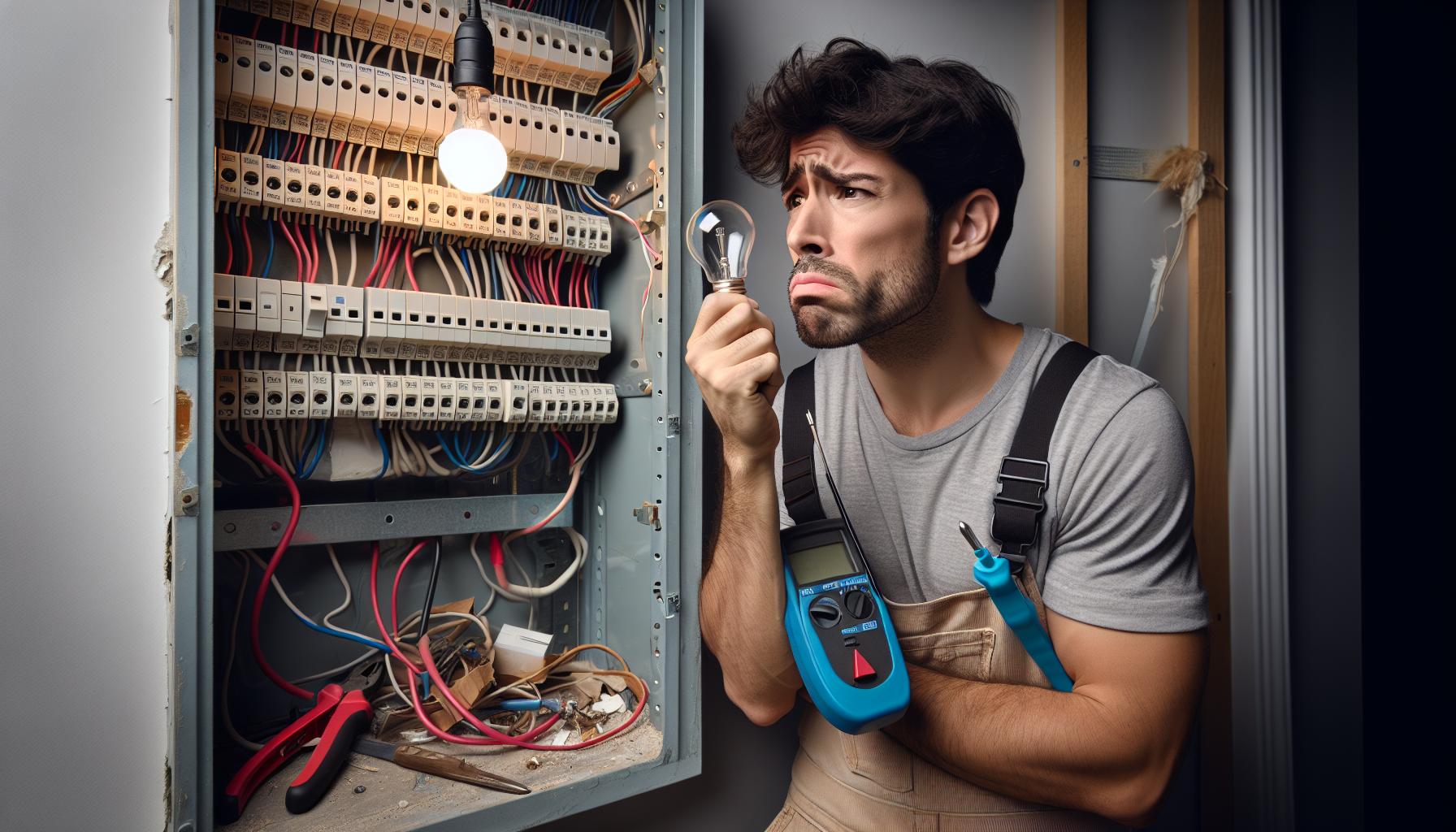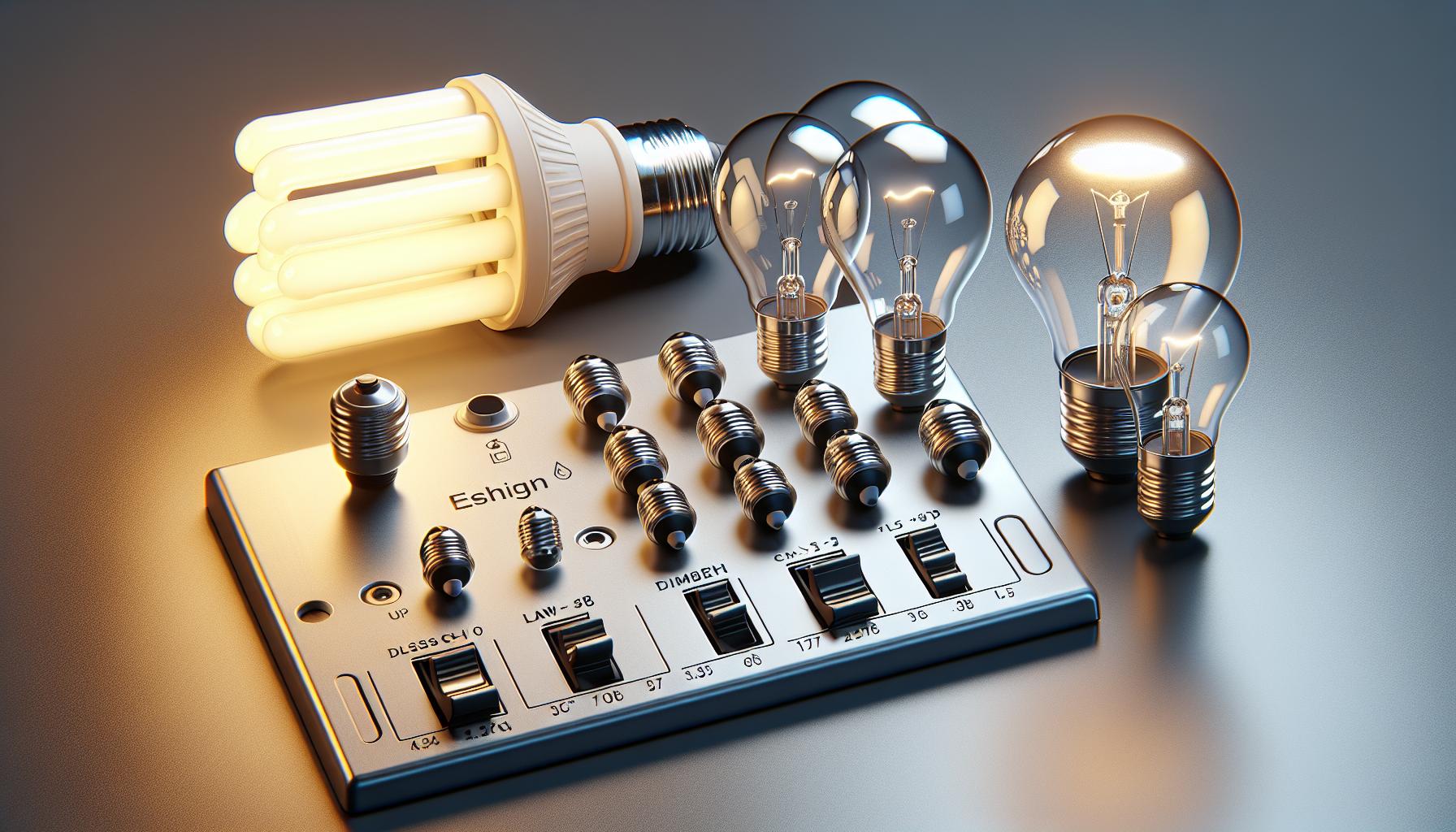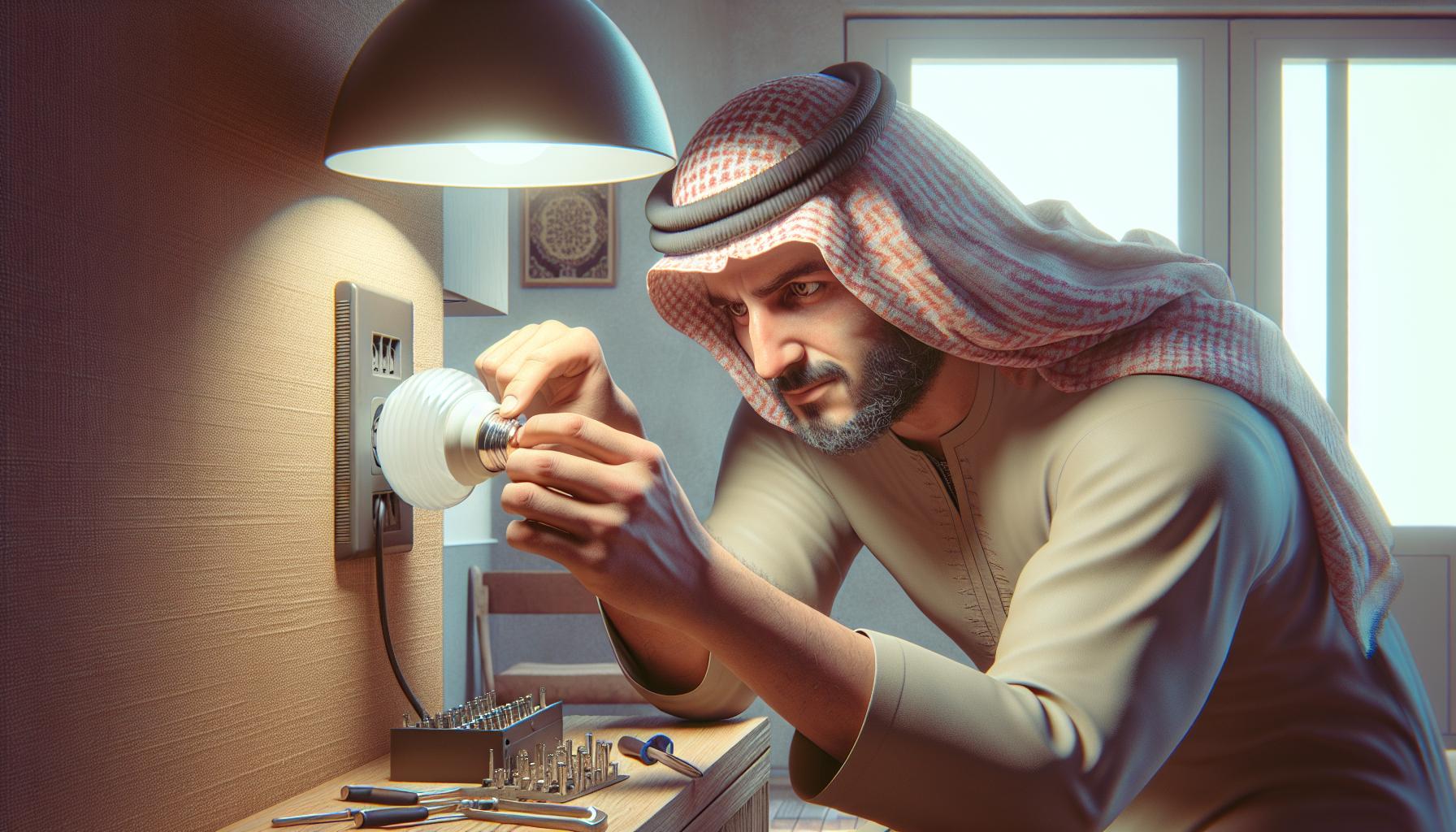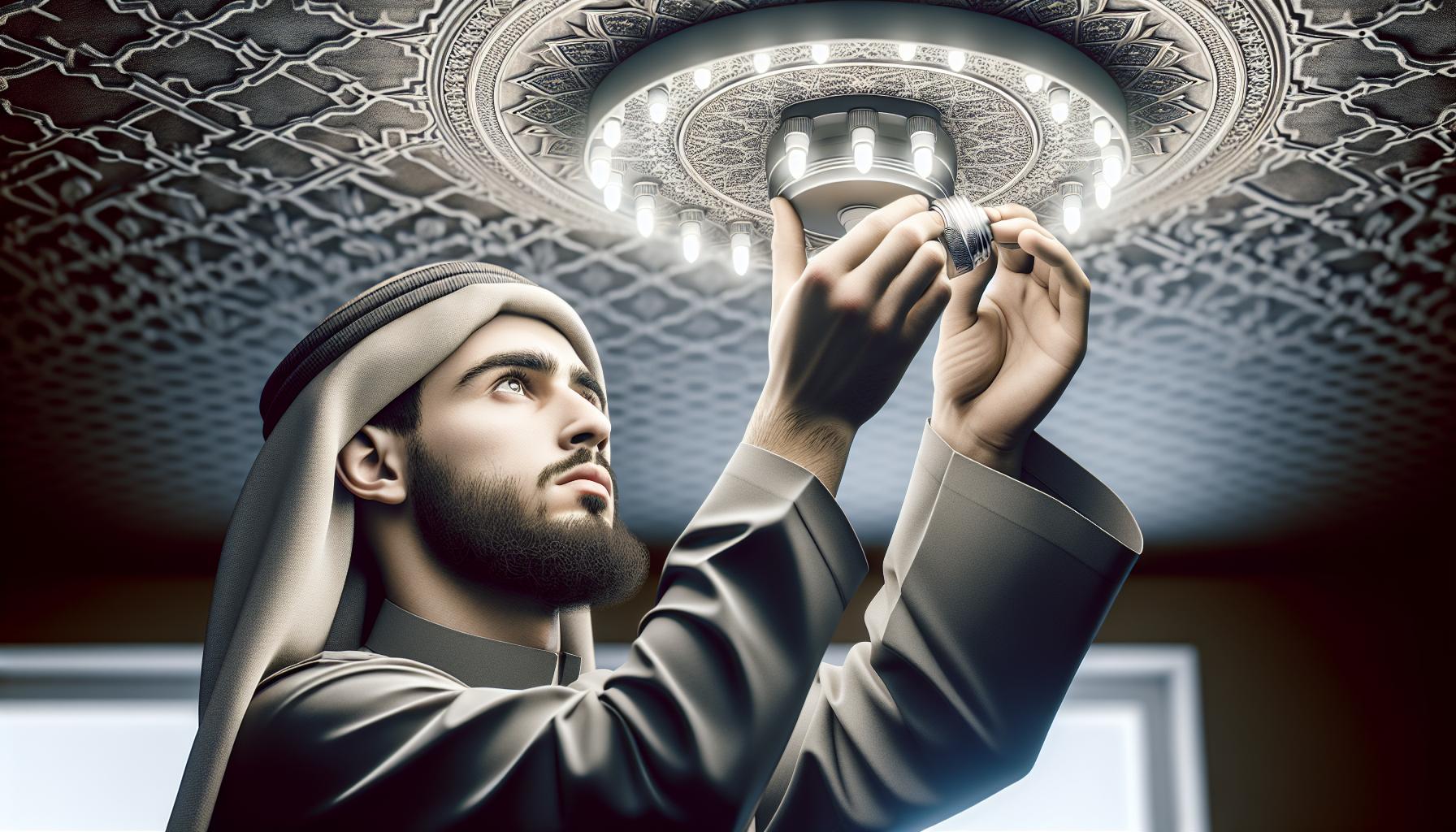Ever wondered why your light bulbs seem to have a shorter lifespan than advertised? You’re not alone. Many homeowners find themselves frequently replacing bulbs, and it can be both annoying and puzzling.

Understanding what causes these illuminating essentials to blow can save you time and money. From power surges to poor installation, the reasons are varied and often easily preventable.
Let’s shed some light on this topic and help you keep your home bright without the constant trips to the store for new bulbs.
Common causes of blown light bulbs
You’ve probably been there, flipping the switch only to be met with darkness as another light bulb gives up the ghost. But why is it that light bulbs seem to blow out more often than they should? Let’s shed some light on the common culprits behind this illuminating issue.
High Voltage in your home can be one of the primary reasons your light bulbs are blowing out. When the voltage in your electrical system exceeds the bulbs’ designed rating, even if only for a millisecond, you can end up shortening the life of your light bulbs significantly.
To illustrate, let’s create a snapshot of typical voltage ratings:
| Country | Standard Voltage |
|---|---|
| United States | 120V |
| Australia | 230V |
Bulbs rated for lower voltages used in a higher voltage environment will inevitably lead to a faster burnout.
Frequent Power Surges, often caused by lightning strikes or power-hopping appliances, inflict undue stress on your light bulbs. These sudden increases in electricity can cause the delicate filaments in incandescent bulbs to snap. Even for more robust LED bulbs, the electronic components can be overwhelmed, leading to failure.
When it comes to Poor Installation, improper screwing in or loose fixtures can cause light bulbs to blow as well. A bulb that isn’t securely fitted can vibrate, leading to a perilous dance for the fine filament inside or disjointed electronics.
- Ensure bulbs are screwed in firmly but not overly tight.
- Avoid touching halogen or incandescent bulbs with bare hands as oils can create hot spots and lead to premature burnout.
Furthermore, Insulation can be a stealthy saboteur. Bulbs, especially LED ones, need proper ventilation to dissipate heat. If insulated too much, they can overheat. To combat this:
- Check that recessed lighting isn’t covered by insulation.
- Leave room around fixtures for air circulation.
Lastly, Faulty Wiring in your house can lead to bulb blowouts. Old or deteriorated wiring can cause inconsistent electrical currents, and flickering lights are a tell-tale sign. You might want to get your wiring checked by a qualified electrician if you suspect it’s contributing to your bulbs’ shortened lifespan.
Electrical factors that contribute to bulb failure

When you’re tackling light bulb issues, it’s like being a detective in your own home. You’ve got to consider all the electrical aspects that could be shortening your bulb’s lifespan. After all, it’s not just about screwing in a new bulb; it’s about understanding the mystery behind the burnouts.
First things first, the voltage supplied to your bulb should match its rating. Overvoltage happens more often than you’d think and it doesn’t just wear out your bulbs faster; it can fry their delicate filaments before you can say “lights out”. It’s worth checking out:
- Bulb voltage ratings
- Your home’s voltage
Next up, let’s talk power surges. These notorious culprits can create a surge of energy that overwhelms your bulb. Imagine a wave crashing down on a sandcastle—that’s what a power surge does to your unsuspecting light bulb. It can come from lightning strikes or from major appliances kicking in, so a good surge protector can go a long way.
« What Light Bulbs Produce the Least Heat? Discover the Coolest Options for Your DIY Projects
What Light Bulbs Work for Plants? Unlock Growth with These Bulb Types »
Loose connections also invite trouble. If the base of your bulb isn’t snug in the socket, you’re in for a rocky ride. This is more than just a nuisance—it’s a potential fire hazard. Keep an eye out for:
- Bulb movement in the socket
- Flickering lights
And don’t forget the silent bulb killer: faulty wiring. Over time, wires can degrade or get nibbled by pests, leading to shorts or weak circuits that can overheat your bulbs.
You’ll want to:
- Inspect accessible wiring regularly
- Hire a professional for hard-to-reach places
Remember, you’re the guardian of your home’s lighting. Every bulb that fails is a clue to unveil, a lesson to learn, and a chance to shine brighter. Keep your detective hat on and monitor these electrical factors, and you’ll be well on your way to achieving lighting bliss.
Factors related to the bulb itself

While external electrical factors play a significant role in light bulb failure, it’s crucial to turn your attention to the bulb itself. Bulb longevity can be greatly influenced by its design, quality, and type.
Incandescent bulbs, for example, are notorious for their shorter lifespan. The delicate filament inside can easily break due to physical shocks or frequent switching on and off. If you’re constantly replacing incandescents, consider switching to LEDs or CFLs which have a sturdier build and longer life.
The quality of the bulb also matters. Opting for cheaper, off-brand options might save you a few bucks upfront, but their lifespan often doesn’t measure up to that of reputable brands. Well-known manufacturers invest in quality materials and thorough testing to ensure their bulbs can withstand the rigors of daily use.
Another key factor is whether the bulb is the right type for its intended use. Using a non-dimmable bulb in a dimmer switch setup can lead to failure, as these bulbs are not designed for varying voltage levels. Always check the packaging to ensure compatibility with your fixtures.
Heat buildup is also a common culprit in shortening a bulb’s life. If a bulb is installed in a space with poor ventilation, such as a closed fixture or a small enclosed lamp, it’s more likely to overheat and fail prematurely. Make sure your light bulbs have enough room to dissipate heat, especially those designed to produce more like halogens.
When dealing with outdoor lighting, consider the environment. Bulbs exposed to the elements should be rated for outdoor use. Inconsistent temperatures and humidity can wreak havoc on bulbs not designed for such conditions. Look for products specifically labeled for outdoor or all-weather use to avoid frequent replacements.
Lastly, the lifespan of a bulb can be greatly impacted by its usage patterns. Leaving lights on for extended periods, more often than necessary, can lead to earlier burnouts. Occupancy sensors or timers can be a savvy way to manage usage without having to rely solely on memory to turn lights off.
Remember, it’s not just about choosing the right bulb but also using it in the right way. Keep these factors in mind to help ensure your lights shine bright for as long as possible.
How improper installation leads to blown bulbs

When you’re in the midst of a DIY home project, the last thing you want is for a newly installed light bulb to blow out prematurely. As a lighting aficionado, you know that proper installation is key to bulb longevity. It’s not just the quality of the bulb but how you fit it into its socket that matters. Here’s a look at how installation missteps can send your bulbs to an early grave.
Firstly, an often overlooked culprit is the incorrect wattage. Each lamp and fixture is designed for a certain wattage, and exceeding that rating can lead to excessive heat build-up. What happens next? The lifespan of your light bulb shrinks dramatically, and you may find yourself replacing bulbs more often than you’d like.
Another common issue arises from the actual handling of the bulb. Always hold the bulb by the base when installing. Even minor smudges from your fingers on the glass can create hot spots which shorten the bulb’s life. This is particularly true for halogen bulbs, where the oil from your skin may significantly increase the bulb’s surface temperature.
For fixtures that vibrate, such as those on ceiling fans or near doors, ensure that they have snug connections. Vibrations can lead to micro-fractures in the filament of incandescent bulbs or disrupt the electronics in LED and CFL bulbs. Special “rough service” bulbs are designed to stand up to these conditions.
- Secure connections are essential but beware of overtightening. A bulb that’s screwed in too tightly can damage both the bulb’s base and the socket itself. This may lead to poor electrical contact and ultimately, bulb failure.
- For those smart bulbs you’re itching to voice-control, ensure that your home’s wiring can handle the technology. Old or incompatible dimmer switches may not be suitable for modern LED bulbs and can cause unexpected blowouts.
Remember, the lifespan of your bulb significantly depends on how well it’s installed. Careful attention to these details not only prolongs the life of your bulbs but also helps you maintain an energy-efficient and well-illuminated home. So next time you’re up on that ladder, take a moment to ensure everything’s just right. Your bulbs will thank you with their enduring glow.
Tips for preventing blown light bulbs

Select the Right Bulb for Each Fixture
When you’re picking out bulbs for your home, it’s crucial to match the bulb to the fixture’s requirements. Each lamp or fixture has a recommended wattage, which indicates the maximum bulb strength it can handle. Exceeding this wattage can lead to overheating and, ultimately, a blown bulb.
- Check the fixture for a sticker or label that states the maximum wattage.
- Stick to LED bulbs as they’re more energy-efficient and produce less heat.
Invest in Quality Bulbs
While it may be tempting to grab the cheapest bulbs off the shelf, investing in quality can save you money in the long run. Higher-quality bulbs generally have a longer lifespan and are less prone to failure.
- Look for bulbs from reputable brands with good reviews.
- Consider bulbs that come with a warranty for added peace of mind.
Monitor Voltage Fluctuations
Voltage spikes in your electrical system are not uncommon, but they can be the nemesis of your light bulbs. Ensure your home’s electrical system is properly maintained to prevent these surges.
- Install surge protectors to guard against sudden spikes in voltage.
- If you experience frequent flickering or blown bulbs, consult with an electrician to check your home’s voltage stability.
Keep It Clean
The condition of your light bulb sockets and wiring plays a big part in bulb longevity. Dirt and corrosion can lead to poor electrical connections, causing bulbs to blow out prematurely.
- Turn off the power to the fixture before cleaning.
- Use a small brush or cloth to remove dirt and debris from the socket.
- For corrosion, lightly rub the contacts with a fine-grade sandpaper to ensure a good connection.
Remember, proper maintenance goes hand in hand with careful installation. Show your bulbs some love, and they’ll serve you well illumination-wise. By being a little more attentive to their needs, your light fixtures can shine bright, saving you from the frustration and expense of frequent replacements.
Conclusion
You’ve got the know-how to keep your bulbs burning bright and your frustrations at bay. Remember, it’s all about making smart choices and staying vigilant. Opt for LED bulbs, stick to the recommended wattage, and don’t skimp on quality—your wallet will thank you later. Keep those sockets clean and watch for voltage spikes; a little attention goes a long way. Here’s to a well-lit home that’s both cozy and cost-effective!
Frequently Asked Questions
What is the significance of selecting the right bulb for each fixture?
Choosing the correct bulb for each fixture ensures compatibility and prevents overheating, which can lead to blown bulbs.
Why is it important to check the maximum wattage for light fixtures?
Checking the maximum wattage prevents using bulbs that are too powerful for the fixture, reducing the risk of overheating and bulb failure.
How can LED bulbs prevent blown light bulbs?
LED bulbs are more energy-efficient and produce less heat compared to traditional bulbs, decreasing the likelihood of overheating and prolonging bulb life.
Should I invest in bulbs from reputable brands?
Yes, quality bulbs from reputable brands tend to last longer and are less likely to blow out prematurely compared to cheaper alternatives.
How do voltage fluctuations affect light bulbs?
Voltage fluctuations can cause excess current to flow to the bulb, potentially overheating and damaging it, leading to a shorter lifespan.
Can keeping the light bulb sockets and wiring clean extend bulb life?
Absolutely. Clean sockets and proper wiring help ensure good electrical contact and reduce the risks of malfunctions that can shorten bulb life.




